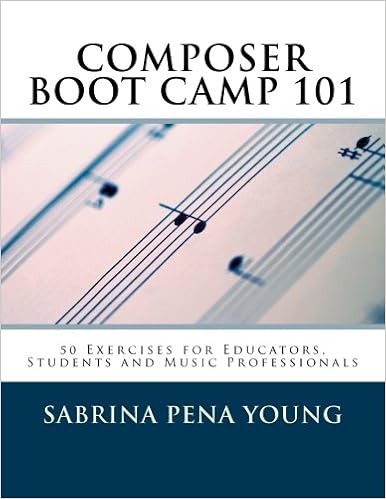With over 15 years’ experience of writing music under her belt, Sabrina Peña Young has composed classical and commercial music, worked on film soundtracks, and even created a groundbreaking virtual opera of her own, called Libertaria.
Now, wanting to help others try their hand at composing, Sabrina has created Composer Boot Camp 101, a resource containing all the basics you need to know for modern composing.
Musical U had the opportunity to talk to Sabrina about her inspiration for the workbook, her advice for beginner composers, and the secret to getting your creative juices flowing.
This is a summary post.
→ Read the full interview
About Composer Boot Camp 101
The workbook was created by Sabrina to demystify the process of composition, and to enable anyone using it to write music, regardless of ability.
The book contains sections for all levels – beginner, intermediate, and advanced – with each section subdivided into five aspects of writing music: inspiration, melody, rhythm, harmony, and orchestration.
The beginner and intermediate sections are geared towards educators and beginner musicians who may not be too familiar with music theory and notation, while the advanced sections are for those aiming to compose at the college or professional level.
To prevent information overload, Sabrina has laid out the information in a clear, step-by-step way, breaking down key elements into exercises.
Who the Workbook Can Help
The beauty of this versatile resource is that it can be used alone or in conjunction with other materials, depending on the skill level and background of the user – it is truly for everyone.
Musicians and educators can comfortably use it as their primary resource for composition. Beginners, Sabrina says, should use it as a supplement to more formal music education, such as music lessons, classes, and workshops.
Throughout the book, users will also find recommendations for other online resources and tips for using technology for the process of composing.
Getting Your Creative Juices Flowing
The jump from musician to composer can be a scary one – how exactly does one begin to write music?
According to Sabrina’s philosophy, inspiration is the key to getting started. She has included numerous inspiration exercises in her workbook, designed to get beginner musicians thinking about how elements as simple as “mood” can be a starting point for a composition:

Sabrina also stresses that unrealistic expectations and perfectionism can act as a roadblock. “Each piece does not have to be a masterpiece,” she says. “Start small and simple. Write a melody or a chord progression. Improvise a lyric or drum out a rhythm.” She suggests writing daily, even if it’s “bad music”.
Other Challenges in Composing (and How to Overcome Them!)
 Achieving success as a composer in the Digital Age is difficult if you don’t have a good grasp of technology. Though Composer Boot Camp 101 requires no computer knowledge to use, in the workbook, Sabrina encourages musicians to learn their way around composition software, as well as familiarize themselves with online promotion for the purpose of finding work.
Achieving success as a composer in the Digital Age is difficult if you don’t have a good grasp of technology. Though Composer Boot Camp 101 requires no computer knowledge to use, in the workbook, Sabrina encourages musicians to learn their way around composition software, as well as familiarize themselves with online promotion for the purpose of finding work.
Self-doubt can be another roadblock. You may wonder, “Am I doing it right?” Without feedback, it can be difficult for musicians to tell if they’re improving and whether they’re on the right track. To keep themselves on track, Sabrina urges musicians to start building a portfolio, and to seek feedback whenever and wherever they can – be it through the internet, or by performing their compositions live. Professional help can even be found online through websites such as MusicXray, which pairs professional songwriters and composers with beginners seeking direction and advice.
Sabrina is a firm believer in the fact that anyone can write music, and hopes that Composer Boot Camp 101 will provide users with practical exercises and marketable skills that will help them on their composing journey. Read more about Sabrina on her professional website, and be sure to pick up a copy of Composer Boot Camp 101 on Amazon!








